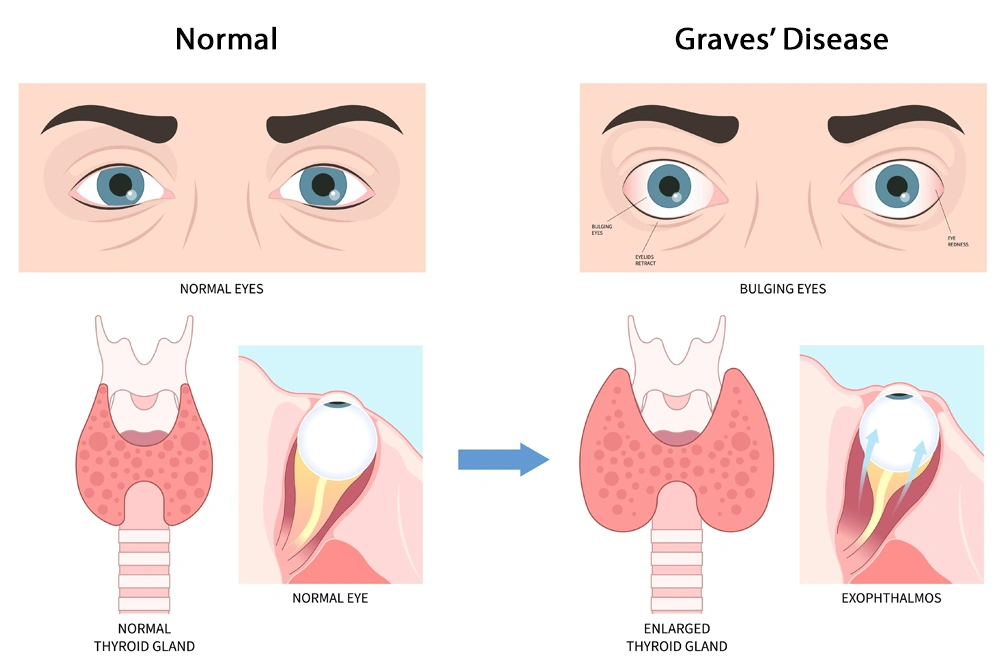
When Diagnosis Hits Home
You know that moment. The one when you’re sitting in yet another doctor’s waiting room, staring at the posters, feeling like your heart’s in your throat. When someone finally utters the words, “Graves’ disease.” It’s like falling down a research rabbit hole, right? Suddenly you’re searching graves disease life expectancy at 2am, half-afraid to click anything.
I want to tell you: You’re not alone. I’ve walked this road with a close friend, and I’ve felt that exact mix of confusion, dread, and—eventually—relief, when real answers started to surface.
How Graves’ Can Shake You Up
Why Is Everyone Freaking Out?
First, the basics—don’t worry, I’m keeping this simple. Graves’ is an autoimmune condition. Which is a fancy way of saying your immune system has made a weird left turn, sending your thyroid into overdrive. Too much thyroid hormone, and suddenly, everything from your heart rate to your mood is changing. You feel hot when everyone else is freezing, get the shakes at the worst times, and your mind just races. (Fun times—said no one ever!)
This is, hands down, the top cause of hyperthyroidism in the U.S., mainly targeting women after 30. But hey, men, you’re not off the hook either. The real kicker? Left untreated, it’s not just about fatigue or the jitters. It can mean heart problems, bone issues, or even vision changes that come out of nowhere, like some comic-book twist you never asked for.Yale’s overview is helpful on this.
Let Me Tell You About Liz’s Sleepless Summer
Let me slip in a quick story—my friend Liz called me one summer sounding frantic. She’d been brushing off her heart palpitations as “stress,” but when she fainted in the kitchen, things got really real. Her journey? Bumpy at first, but she got good care, and honestly, she’s living proof you can turn the ship around. But those early days? Totally overwhelming. Sometimes you can see stories like hers in detail, like in Graves’ disease ruined my life, which pulls no punches about how it feels when you first get the news.
Is Life Expectancy Really Shorter?
Big Questions, Blunt Answers
Let’s cut right to what everyone’s really wondering—will Graves’ disease actually shorten your life? Here’s what plenty of research on graves disease life expectancy has found: untreated, this condition can absolutely gobble up years that should still belong to you. Some research suggests as much as 3.5 years less than folks with lower thyroid activity.Research on complications and prognosis spells this out.
But (and this is a massive but) that’s not the whole story. The reality is, graves disease life expectancy jumps right back up toward normal—and I mean like, 70s or 80s—if you get the right treatment and keep it up. The difference between “terrifying news” and “normal lifespan” comes down to whether you take action and stick with it. Not a perfect deal, but not a tragedy either.
Table: Potential Life Expectancy Scenarios
| Scenario | Estimated Life Expectancy Impact | Why? |
|---|---|---|
| Untreated Graves’ | Up to 3.5 years shorter | High risk for heart failure, stroke, osteoporosis |
| Well-treated Graves’ | Near-normal lifespan (70s, 80s+) | Risks managed, complications rare |
| Frequent relapses/uncontrolled hyperthyroidism | Higher risk of early death (double within 5 years) | Ongoing thyroid hormone issues, cardiac stress |
To break it down even further: the sooner you get control of your thyroid, the better your odds. Several studies say the risk of dying early doubles if your thyroid levels are way off for five years after diagnosis. It feels harsh, but there’s a silver lining: you have more power than you might think to improve your odds.Healthline goes deeper on the stats.
Treatments: Not as Scary as They Sound
What Are Your Options, Really?
It’s easy to panic here. Pills? Radioactive stuff? Surgery?! Deep breath. Most people start with medications called antithyroid drugs and sometimes a beta-blocker to calm the symptoms. Feels medical, sure, but it’s manageable. Honestly, you might be surprised—many people settle into a routine without the side effects they worried about. Radioactive iodine? Despite the name, it’s been safely used for decades, aiming to purposely “chill out” your thyroid. Surgery is a last resort.
There’s a ton of variety in what works and how quickly symptoms let up. Some people get relief fast, others, like my buddy Liz, need tweaks to their plan. What matters is not giving up after the first round. Your docs will adjust your plan until your numbers look steady and you feel like—you again.
Quick Comparison Table: Treatment Paths
| Treatment | Lifespan Impact | Main Pros | Main Cons/Risks |
|---|---|---|---|
| Antithyroid meds | Typically normal | Non-invasive, few side effects | Relapse possible |
| Radioactive iodine | Typically normal | Often permanent fix | Can cause underactive thyroid |
| Surgery | Typically normal | Immediate solution | Total loss of thyroid function; scar |
Oh, and if you land in stories talking about quality-of-life dips after radioiodine, remember that with monitoring, most people find relief—even energy for fitness goals again. These days, even the harsher treatments do not mean you can’t get back to hiking, lifting, or parenting at full speed.Cleveland Clinic covers common paths.
How Graves’ Messes With Everyday Life (But Doesn’t Have To)
Heart Pound, Hair Thinning, Sweat: What Gives?
Graves’ doesn’t just change your energy levels. It can bring eye issues (think gritty, bulgy, annoying), unpredictable hunger, heat intolerance, pounding heart, brittle bones, and sometimes even anxiety that feels like caffeine overload… without the fun.See eMedicine for more on day-to-day effects
Funny story—after diagnosis, Liz became obsessed with light sweaters and water bottles. “Layers are my new personality,” she joked. Her humor got her through when other people just didn’t get why a walk in the sun was overwhelming. Have you ever noticed how little things—like sitting near a fan, or skipping that extra cup of coffee—become part of your whole “wellness toolkit”?
Can Graves’ Kill You? The Blunt (But Not Hopeless) Truth
The very name can make people worry about dying. But the truth is, for most people who get care, graves disease life expectancy is normal. Problems show up mainly for folks who don’t treat it, drop out of care, or have a rare extreme complication called thyroid storm. Want deep dive details? The article Can Graves’ disease kill you does a solid job of laying out when and why risks actually jump.
Still, it’s important to keep up with appointments, especially after the first year. No shame in feeling anxious about labs. (Snap a selfie with your dog after you get blood drawn—no rule says you can’t make it a little fun, right?)
Graves’ Disease Life Expectancy: Hope, Habits, and Hurdles
Take It From People Who’ve Been There
Here’s the thing: I’ve seen first-hand (and read countless real accounts) that graves disease life expectancy can be full of life. You’ll hear stories of people running marathons post-diagnosis, starting new families, hitting all the “normal” milestones. Are there days where you question everything? Absolutely. But you figure out a groove—yoga for stress, smarter snacks, letting friends in when fatigue hits. Maybe you even share your own “it ruined my life—then it didn’t” story, like in Graves’ disease ruined my life.
When To Push for More Help
If numbers don’t budge, or you just don’t feel right, get a second opinion. Endocrinologists are thyroid detectives. Don’t wait if your heart races or vision changes—catching things early matters for life expectancy.
Also: Don’t tough it out alone. Find a support group online, or rally a friend to go to appointments. Even if you’re “not a joiner,” connecting helps way more than going solo.
By the way, for all the worry about fatal complications, current research on how Can Graves’ disease kill you shows that proper management shuts down most big risks. Good stuff to remember when anxiety creeps in.
Your New Normal (And Why That’s OK)
How to Keep Your Body (and Mind) On Track
Let’s get tactical for a sec. Graves’ isn’t something you “beat.” But you manage the heck out of it. Catch your own warning signs—skipped doses, stress spikes, missed labs? Reach out before it snowballs. Build routines: quick walks, green smoothies (or just, you know, less soda), sleeping enough, getting sunlight.
Have a laugh when you can. It helps. Honestly, the story isn’t “graves disease life expectancy is a death sentence,” but rather “here’s how I kept living—and sometimes lived better.” If you want inspiration after a tough start, tap into stories like Graves’ disease ruined my life to see it’s possible to move past the rough stuff.
Big Takeaways… And A Pep Talk for the Road
So we’ve circled all the worry—graves disease life expectancy can dip if you ignore it, give up, or let fear keep you from getting care. But here’s the important part: with good treatment and some self-love, your odds look just as bright as anyone else’s. Tons of people thrive with Graves’ in their story. They work, play, travel, dance at weddings, laugh loudly at corny movies—whatever they want, really.
Maybe you’re reading this with browser tabs open on symptoms and treatments and worst-case scenarios. That’s normal. But it doesn’t have to be permanent. Today, take one step—a message to your doc, a healthy meal, maybe just asking a family member to listen while you vent. Every small step counts. You’ve got way more control here than it might feel.
So, my friendly nudge to you: Don’t let the diagnosis write your ending. Use it to tweak your routine, learn more about your body, discover support you never knew you had. If you remember anything, let it be this: most people with Graves’ disease go on to live long, beautiful, ordinary (and sometimes extraordinary) lives. What small step will you take today?


















Leave a Reply
You must be logged in to post a comment.